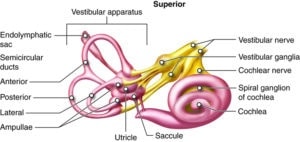Barany
FurthermoreBarany, Robert (1876-1936) Austrian Physician Robert Barany was born on April 22, 1876, in Vienna. The eldest son of the manager of a farm estate. Also His mother, Maria Hock, was the daughter of a well-known Prague scientist. The young Barany contracted tuberculosis, which resulted in permanent knee problems.
He completed medical studies at Vienna University in 1900, and in 1903, he accepted a post as demonstrator at the otological clinic.
The middle ear’s vestibular system:
Barany developed a rotational method for testing the middle ear, known as the vestibular system, that commands physical balance by integrating an array of neurological, biological, visual, and cognitive processes to maintain balance.
The middle ear’s vestibular system is made up of three semicircular canals and an otolith. Inside the canals are fluid and hairlike cilia that register movement. As the head moves, so does the fluid, which in turn moves the cilia that send signals to the brain and nervous system. The function of the otolith, a series of calcium fibers that remain oriented to gravity, is similar. Both help the body to stay upright. Barany’s contributions in this area won him the Nobel Prize in physiology in 1914. To receive his award, he had to be released from a Russian prisoner of war camp in 1916 at the request of the prince of Sweden.
Furthermore, After the war he accepted the post of principal and professor of the otological Institute in Uppsala, where he remained for the remainder of his life.
During the latter part of his life, Barany studied the causes of muscular rheumatism. Although he suffered a stroke, this did not prevent him from writing on the subject. He died at Uppsala on April 8, 1936. An elite organization called the Barany Society is named after him and is devoted to vestibular research.
barchan A crescent-shaped dune with wings, or horns, pointing downwind.





